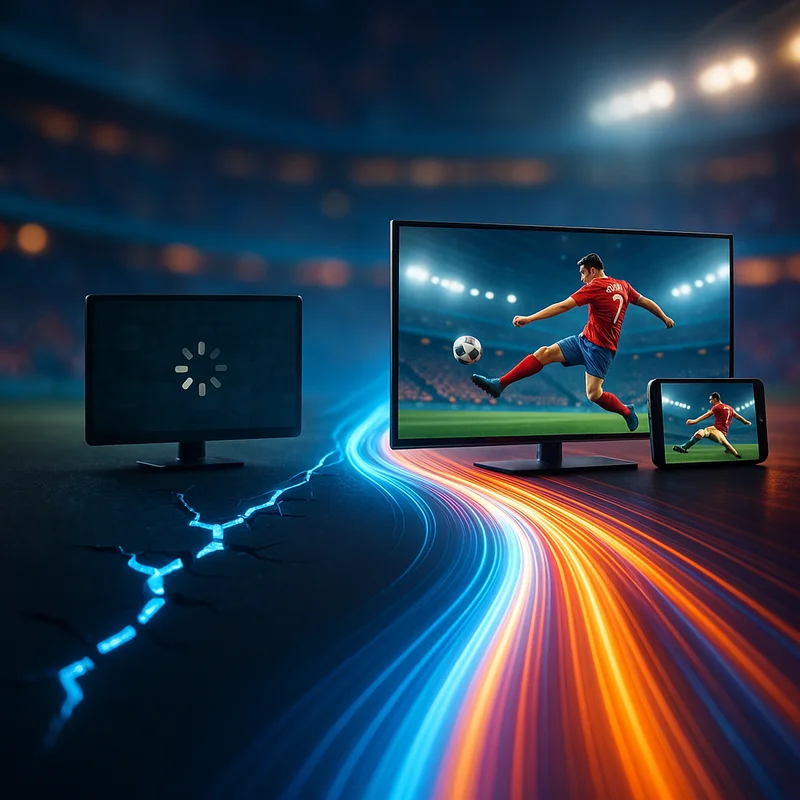This guide will help you understand how much internet speed you really need for a seamless streaming experience, how various factors can affect your connection, and what you can do to optimize it. Whether you're new to streaming or looking to upgrade your setup, ensuring your internet speed meets the demands of high-quality live TV is the first step towards enjoying your entertainment without interruptions.
Why Does Internet Speed Matter for Streaming?
Your internet speed, measured in Megabits per second (Mbps), dictates how quickly data can travel from the internet to your devices. For streaming, this translates directly to:
- Video Quality: Higher speeds allow for higher resolution video (HD, 4K).
- Buffering: Sufficient speed prevents your stream from pausing repeatedly to load more data.
- Multiple Users/Devices: Adequate bandwidth ensures everyone in your household can stream simultaneously without slowing down the connection for others.
"Think of your internet connection as a highway. The more lanes (bandwidth) it has, and the faster cars (data) can travel, the smoother your journey (streaming experience) will be."
Recommended Internet Speeds for Live TV
While minimum speeds can get you by, recommended speeds ensure a consistently smooth experience, especially for live content where delays are more noticeable.
| Streaming Quality | Minimum Speed (per stream) | Recommended Speed (per stream) |
|---|---|---|
| Standard Definition (SD) | 3 Mbps | 5-8 Mbps |
| High Definition (HD - 720p/1080p) | 5 Mbps | 10-20 Mbps |
| Ultra High Definition (4K UHD) | 15 Mbps | 25-50 Mbps |
Important Considerations
Multiple Devices: If multiple people in your household are streaming simultaneously, you'll need significantly more bandwidth. A household with two 4K streams and one HD stream might need 70-100+ Mbps.
Live vs. On-Demand: Live streaming can sometimes be more demanding than on-demand, as there's less buffer time.
Service Specifics: Different streaming services might have slightly different recommendations. Always check the specific requirements for services like YouTube TV, FuboTV, or Hulu + Live TV.
Factors That Can Affect Your Internet Speed
Even if you pay for a high-speed plan, several factors can impact the actual speed you experience:
Wi-Fi vs. Wired Connection: Ethernet cables provide a more stable and often faster connection than Wi-Fi, which can be affected by interference and distance.
Router Quality & Placement: An old router or one placed in a corner or behind obstacles can significantly degrade your Wi-Fi signal.
Number of Connected Devices: Every device actively using your internet connection consumes a piece of your available bandwidth.
Internet Service Provider (ISP) Throttling: Some ISPs might intentionally slow down certain types of traffic, like video streaming, during peak hours.
Peak Usage Times: During evenings or weekends, when many people in your neighborhood are online, overall speeds can drop due to network congestion.
Outdated Equipment: Old modems or network cards in your devices might not be capable of supporting the full speed of your internet plan.
How to Check Your Internet Speed
Knowing your current speed is the first step to identifying if it's meeting your streaming needs.
Use an Online Speed Test
Go to a reputable speed test website (like Speedtest.net or Fast.com) on the device you typically use for streaming.
Run the Test
Click "Go" or "Start" and wait for the results to load.
Interpret the Results
The test will show your download speed (crucial for streaming). Compare this number to the recommendations in the table above.
Troubleshooting Tips to Improve Your Speed
If your speed is lower than expected or you're experiencing buffering, try these tips:
Restart Your Router/Modem
Unplug them for 30 seconds, then plug them back in. This often resolves minor connectivity issues.
Move Your Router
Place your router in a central location, away from walls and large appliances.
Use a Wired Connection
Whenever possible, connect your streaming device directly to your router with an Ethernet cable.
Limit Background Activity
Close unnecessary apps or downloads on other devices while you are streaming.
Ready to Stream Seamlessly?
A fast and stable internet connection is the foundation of a fantastic live TV streaming experience. By understanding your speed requirements and optimizing your setup, you'll be well on your way to enjoying all the benefits of cord-cutting.
If you're still exploring your streaming options, be sure to check out our Getting Started: Your First Steps to Streaming Freedom guide has you covered. And to make sure you have the right gear, explore our recommendations for the Best Streaming Devices for Sports Fans guide.
Ready to see what's streaming live right now and start watching your favorite sports and shows today?
See What's On Now at LiveCloak!